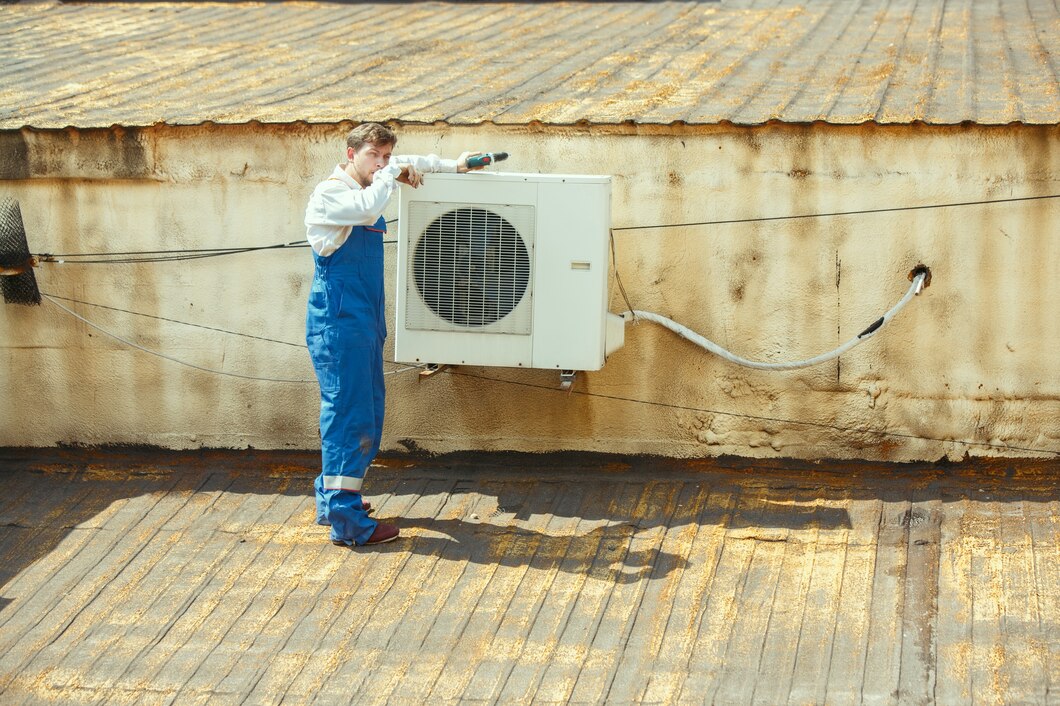
As technology advances, many homeowners find themselves needing to replace old air conditioners with more efficient, modern models. However, removing and disposing these outdated units is not just a matter of clearing space for the new ones. Proper disposal of old air conditioners is critically important for environmental protection and human health. These units contain refrigerants and other materials that can be harmful if released into the atmosphere or improperly handled.
Stay tuned as we highlight the environmental impacts of incorrect disposal and explain the appropriate steps homeowners should take to ensure safe and responsible disposal. Champion Services is dedicated to helping you understand these practices to adhere to legal regulations and contribute to a sustainable future. Whether you are upgrading your air conditioner or managing a defunct one, knowing how to dispose of your old unit properly is essential.
1. Understanding the Hazards of Improper Disposal
Disposing of old air conditioners improperly poses significant environmental and health risks. The primary concern revolves around the refrigerants these units contain. Older air conditioners typically use Freon (R-22), a chlorofluorocarbon (CFC) that contributes to ozone depletion if released into the atmosphere. Moreover, these refrigerants are potent greenhouse gases. If they escape, they can trap heat in the atmosphere, contributing to global warming.
Additionally, air conditioners contain other hazardous components such as oils, mercury found in thermostats, and lead in soldering material. If these substances leak, they can contaminate land and waterways, posing health risks to wildlife and humans alike. Ensuring that these materials do not end up in landfills where they can leach into the ground and groundwater systems is paramount for protecting our environment.
2. Legal Requirements for Air Conditioner Disposal
Only certified professionals like our team can handle refrigerant-containing appliances at the end of their life to ensure the refrigerants are recovered and reclaimed or destroyed according to federal standards. It’s essential for homeowners to understand that tossing an old air conditioner in the trash or taking it to a scrap metal dealer who is not certified to handle refrigerants is illegal. Compliance with these regulations helps avoid potential fines and supports environmental conservation efforts.
3. Steps to Proper Disposal
The process of disposing of an old air conditioner involves several steps that need careful consideration to ensure safety and compliance with regulatory requirements:
Hire Qualified Professionals
Always rely on our HVAC professionals to dispose of old air conditioners. They have the training and certification to safely and legally manage hazardous components. They will ensure that the refrigerant is recovered and recycled appropriately, minimizing any environmental impact.
Consider Recycling
Many parts of an old air conditioner are recyclable. Metals like aluminum and copper can be recycled indefinitely, reducing the need for new raw materials and helping conserve resources and energy. Ask our team about recycling options. We ensure that the recyclable parts are sent to proper recycling facilities once hazardous components are safely removed.
Donate If Applicable
If the air conditioner is still functional but is simply being replaced due to an upgrade, consider donating it to a charity or local organization. This prevents the unit from ending up in a landfill and helps those in need. Ensure that the air conditioner is in good working condition and check with the organization if they accept such donations.
Environmental Benefits of Proper Disposal
Properly disposing of old air conditioners has profound environmental benefits. By preventing the release of harmful refrigerants and other toxic substances, we significantly reduce the potential harm to the ozone layer and lower the contribution to global warming. Furthermore, recycling parts of the air conditioner keeps useful materials in circulation, decreasing the demand for virgin materials, which, in turn, reduces the energy usage and pollution associated with manufacturing new components.
Handling these old units responsibly ensures that we are doing our part in maintaining a healthy planet. It allows us to manage finite resources more wisely and reduces the overall environmental impact associated with hazardous waste.
4. Beyond Disposal: Choosing Eco-Friendly Replacements
When it’s time to replace your old air conditioner, consider opting for more environmentally friendly units. Modern air conditioners offer improved energy efficiency, use less harmful refrigerants (such as R-410A, which does not deplete the ozone layer), and are designed to have a smaller environmental footprint. Energy-efficient models help conserve natural resources and save on energy bills.
Moreover, when selecting a new unit, look for the ENERGY STAR label, which indicates that the appliance meets strict energy efficiency guidelines. Choosing such models supports environmental sustainability and promotes healthier living environments.
Commit to Sustainability with Expert Guidance
Properly disposing of old air conditioners is not just about adhering to regulations—it’s about embracing a commitment to environmental stewardship and public health. By choosing responsible methods for AC disposal and recycling in Winchester, NV, you play a crucial role in reducing harmful emissions and promoting resource conservation. Let us help you manage the disposal of your outdated air conditioning systems responsibly and efficiently.
If you’re ready to dispose of your old air conditioner or are looking for eco-friendly alternatives, look no further than Champion Services. Our skilled team is here to provide professional advice and AC services, ensuring that your HVAC needs align with best practices for the environment and legal compliance. Contact us today to take a step towards a greener, more sustainable future. Your choices matter—make them count with expert assistance by your side.
